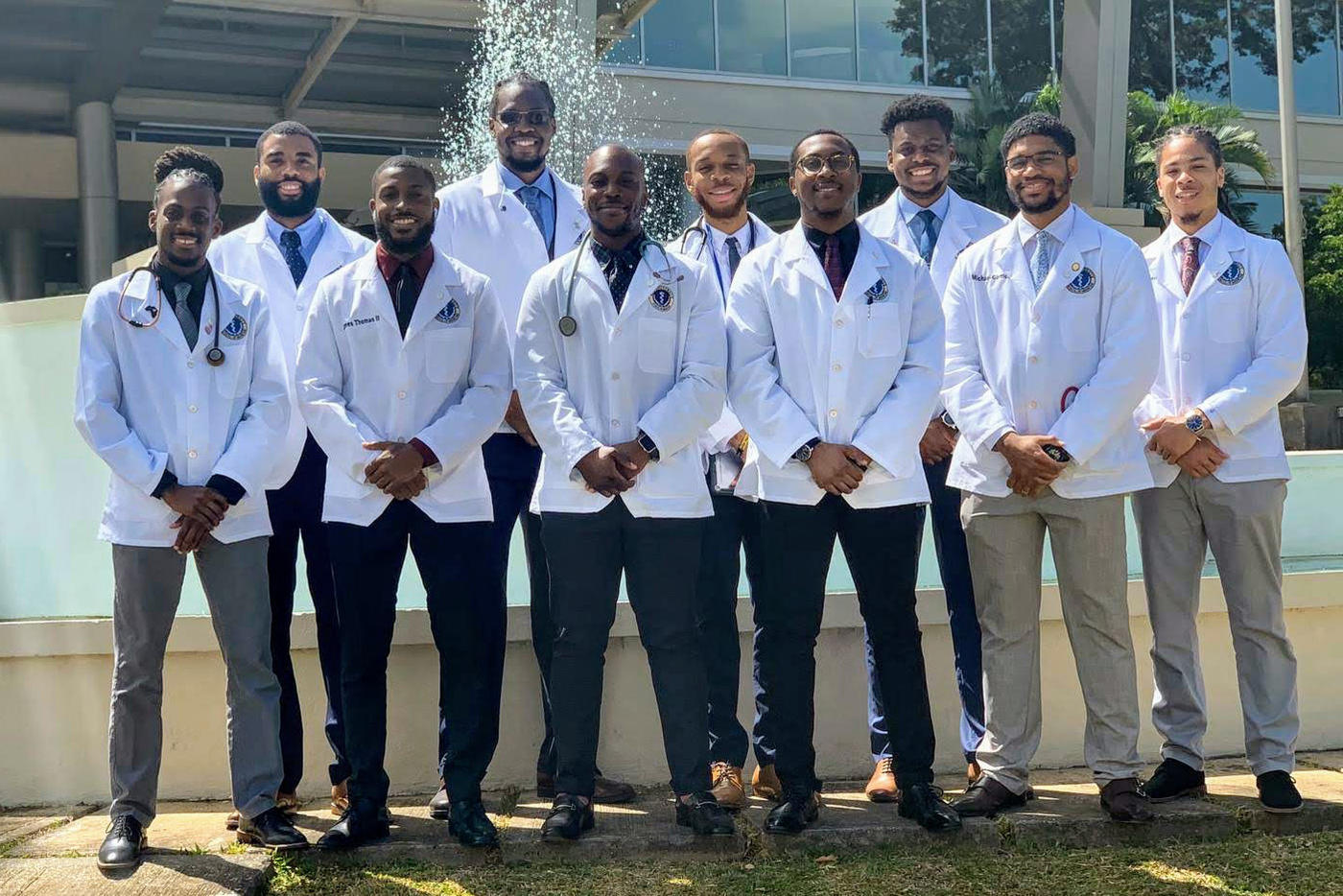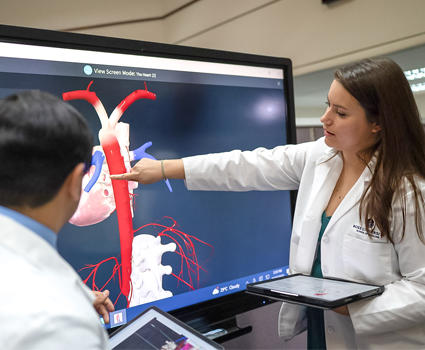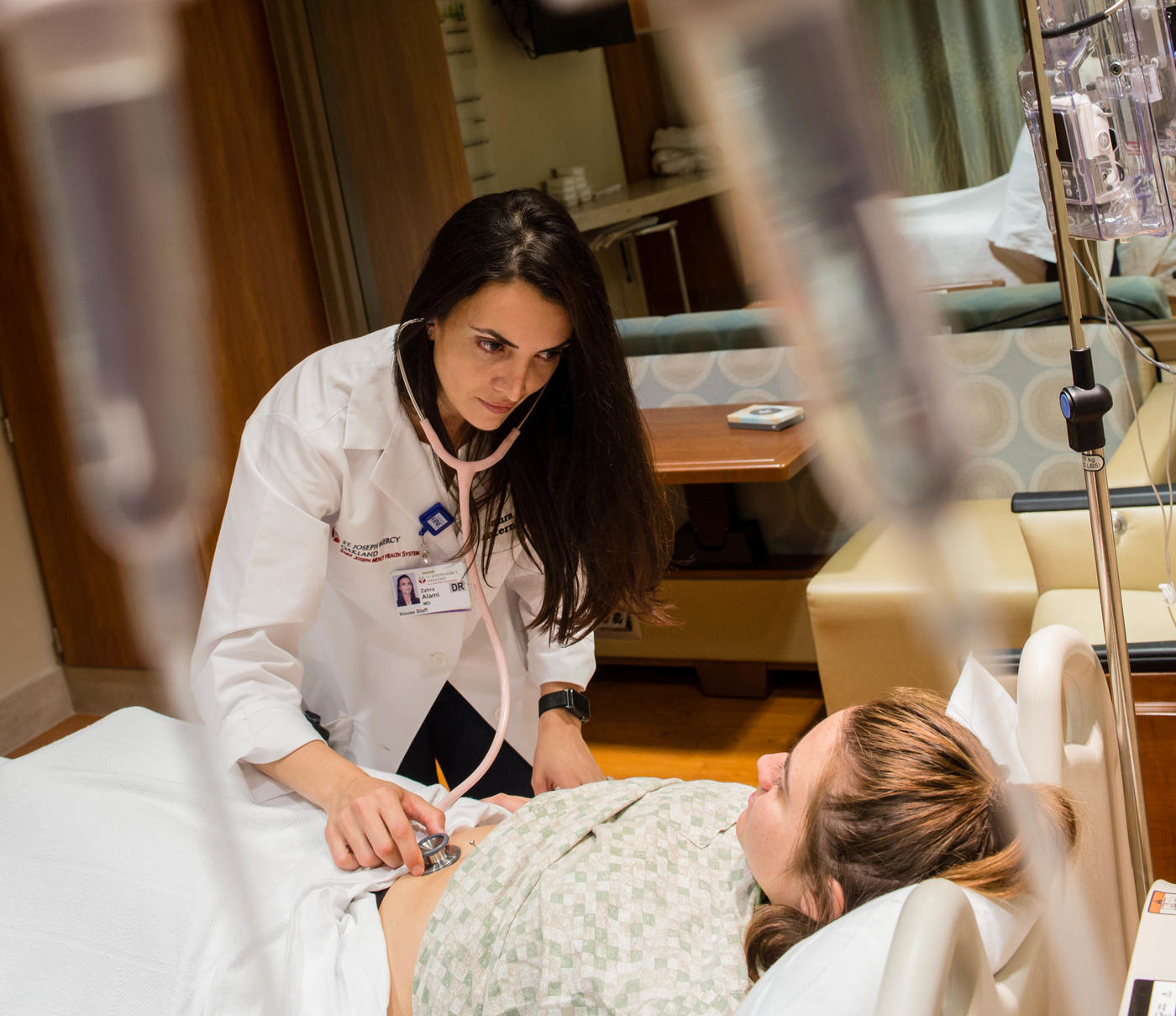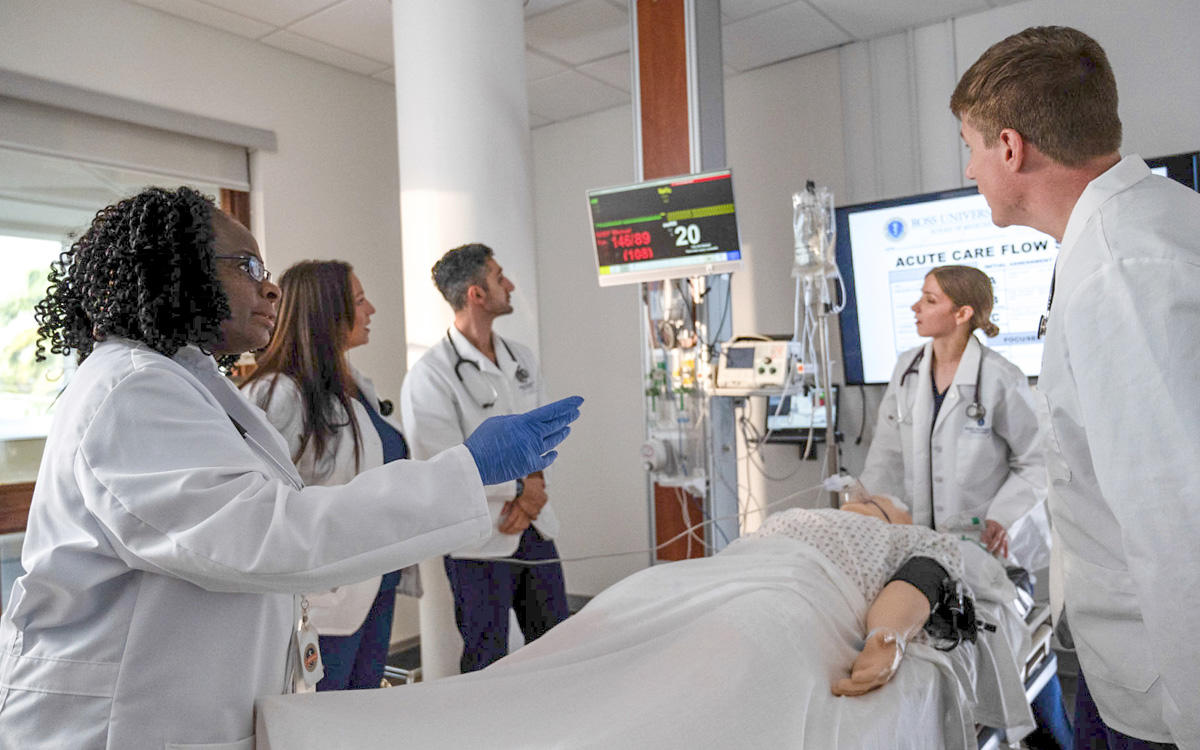MD Program Objectives
Ross University School of Medicine’s medical education program is guided by a set of objectives or competency areas that our students must demonstrate upon graduation. These learning objectives map to our curriculum and institutional values and align with ACGME core competencies.

Patient Care
Students must demonstrate the ability to apply knowledge, skills and attitudes necessary for competent patient care, and are expected to:
- Recognize the clinical presentation of the common or life-threatening diseases and injuries and understand the principles of treatment and management.
- Acquire clinical knowledge (both in-patient and out-patient settings) in the six major disciplines: family medicine, internal medicine, obstetrics and gynecology, pediatrics, psychiatry, and surgery.
- Perform routine technical procedures including at a minimum venipuncture, inserting an intravenous catheter, inserting a nasogastric tube, inserting a Foley catheter, suturing lacerations, record an ECG, and certify in ACLS & PALS.
- Interpret the results of commonly used diagnostic tests and procedures.
- Construct by clinical reasoning, a differential diagnosis and initial investigations for common clinical conditions.
- Construct appropriate management strategies (both diagnostic and therapeutic) for patients with common conditions, both acute and chronic, including medical, psychiatric, and surgical conditions, and those requiring short- and long-term rehabilitation and end-of-life care.
- Recognize patients with immediately life threatening cardiac, pulmonary, neurological, or other conditions regardless of etiology, and institute appropriate initial therapy
Medical Knowledge
Students must demonstrate knowledge of established and evolving biomedical, clinical, epidemiology and socio-behavioral sciences.
Students are expected to:
- Describe the normal structure and function of the body and each of its major organ systems.
- Describe molecular, biochemical, and cellular mechanisms that are important in maintaining the body's homeostasis.
- Describe the various causes of disease states including genetic, developmental, metabolic, toxic, microbiologic, autoimmune, neoplastic, degenerative, and traumatic and the ways in which they operate on the body (pathogenesis).
- Describe the most frequent clinical, laboratory, roentgenologic, and pathologic manifestations of common maladies.
- Describe important non-biological determinations of poor health and of the economic, psychological, social, and cultural factors that contribute to the development and/or continuation of maladies.
- Understand the epidemiology of common maladies within a defined population, and the systemic approaches useful in reducing the incidence and prevalence of those.
- Understand the mechanisms of the cause of pain, describe strategies for pain management and describe the unique issues in providing palliative care.
- Apply knowledge of the infectious disease process and universal precautions to effectively reduce risk of the communicable disease to the patient as well as medical staff.
- Perform practical exercises that entail accurate observations of biomedical phenomenon and critical analyses of data.

Interpersonal Skills and Communication
Students must demonstrate interpersonal and communication skills that result in the effective exchange of information, collaboration with patients, their families and health professionals, and equity in delivery of care.
Students are expected to:
- Communicate effectively with patients, families, and the public, as appropriate, across a broad range of socio-economic and cultural backgrounds, demonstrating empathy and respect.
- Demonstrate effective communication skills and English language proficiency.
- Demonstrate proficiency in verbal and nonverbal communication specific to culture, gender, and patient understanding.
- Communicate effectively with physicians, other health professionals, and health-related agencies.
- Communicate effectively, both orally and in writing, with patients, families, colleagues, nurses, and other staff with whom physicians must exchange information in carrying out their responsibilities.
- Work effectively as a member or leader of a healthcare team or other professional group;
- Maintain comprehensive, timely, and legible medical records, if applicable.
Systems-based Practice
Students must demonstrate an awareness of and responsiveness to the larger context and system of health care, as well as the ability to call effectively on other resources in the system to provide optimal health care.
Students are expected to:
- Work effectively in various healthcare delivery settings and systems relevant to their clinical specialty.
- Understand various approaches to the organization, financing, and delivery of health care.
- Coordinate patient care within the healthcare system relevant to their clinical specialty.
- Incorporate considerations of cost awareness and risk benefit analysis in patient- and/or population-based care as appropriate.
- Advocate for quality and optimal patient care systems.
- An awareness of the importance of issues relating to proper charting, abandonment, disclosure, standards of care, malpractice, privileges, public reporting requirements, and informal and informed consent.
- Work in inter-professional teams to enhance patient safety and improve patient care quality.
- Understand and respect the roles of other healthcare professionals, and of the need to collaborate with others in caring for individual patients and in promoting the health of defined populations.
- Basic understanding of risk management, resource utilization, patient safety, and medical errors.
Personal and Professional Development
Demonstrate the qualities required to sustain lifelong personal and professional growth.
Students are expected to develop skills and habits to be able to meet the following goals:
- Develop the ability to use self-awareness of knowledge, skills, and emotional limitations to engage in appropriate help-seeking behaviors.
- Demonstrate healthy coping mechanisms to respond to stress.
- Manage conflict between personal and professional responsibilities.
- Practice flexibility and maturity in adjusting to change with the capacity to alter one's behavior.
- Demonstrate trustworthiness that makes colleagues feel secure when one is responsible for the care of patients.
- Provide leadership skills that enhance team functioning, the learning environment, and/or the health care delivery system.
- Demonstrate self-confidence that puts patients, families, and members of the health care team at ease.
- Recognize that ambiguity is part of clinical health care and respond by utilizing appropriate resources in dealing with uncertainty.
Practice-based Learning and Improvement
Student must demonstrate the ability to investigate and evaluate their care of patients, to appraise and assimilate scientific evidence, and to continuously improve patient care based on constant self- evaluation and life-long learning.
Students are expected to develop skills and habits to be able to meet the following goals:
- Identify strengths, deficiencies, and limits in one's knowledge and expertise.
- The capacity to recognize and accept limitations in one's knowledge and clinical skills, and a commitment to continuously improve one's knowledge and ability.
- Set learning and improvement goals.
- Identify and perform appropriate learning activities.
- Systematically analyze practice using quality improvement methods and implement changes with the goal of practice improvement.
- Incorporate formative evaluation feedback into daily practice.
- Demonstrate steadily improving performance as a result of self-reflection, critical self-appraisal, and openness to feedback.
- Locate, appraise, and assimilate evidence from scientific studies related to their patients' health problems.
- Ability to engage in lifelong learning to maintain sufficient familiarity with scientific advances to ensure they are integrated appropriately with patient care.
- Use information technology to optimize learning.
- Research and retrieve (from electronic databases or other resources), manage, and utilize biomedical information for solving problems and making decisions that are relevant to the care of individuals.
- Participate in the education of patients, families, students, residents, and other health professionals.

Professionalism
Students must demonstrate a commitment to carrying out professional responsibilities and an adherence to ethical principles, and are expected to demonstrate:
- Compassion, integrity, and respect for others.
- Students’ interactions must reflect a spirit of cooperation and respect in working with members of the healthcare team including patients and community.
- An awareness of the personal manners, dress, grooming, speech, and interpersonal skills expected by the community of a medical professional.
- Describe ethical and moral aspects of clinical practice.
- Responsiveness to patient needs that supersedes self-interests.
- A commitment to advocate the interests of one's patients over one's own interests.
- A commitment to provide care to patients who are unable to pay and to advocate for access to health care for members of under- served populations.
- Respect for patient privacy and autonomy.
- Exhibit respect and tolerance towards the values and beliefs of others serving and served by the health care system; facilitate the clarification and negotiation of differences in values and beliefs in others; and avoid the use of physician authority to advance personal values and beliefs of a non-clinical nature.
- Compassionate treatment of patients, and respect for their privacy and dignity.
- Accountability to patients, society, and the profession.
- Honesty and integrity in all interactions with patients, families, colleagues, and others with whom physicians must interact in their professional lives.
- Personal qualities of reliability, dependability, open-mindedness, and curiosity. The ability to consistently and dependably carry out one's duties with honesty, personal integrity, self-motivation, and self-regulation.
- The ability to assume responsibility, think critically, exercise sound judgment, and act prudently with full awareness of the limits of one's intellectual and technical abilities.
- The ability to seek help when needed, to deal with academic, personal, or interpersonal problems.
- A willingness to monitor the behavior and competence of professional peers and to deal appropriately with inadequate or unethical behavior, evidence of impairment, unprofessional practices, or conflict of interest.
- Sensitivity and responsiveness to a diverse patient population, including but not limited to diversity in gender, age, culture, race, religion, disabilities, and sexual orientation.
- Ability to understand cultural differences and how they relate to providing quality care, dispelling misconceptions, and avoiding bias.
- Awareness of how patient culture, ethnicity, gender, sexual orientation, and socio-economic status affect the clinical encounter.
Interprofessional Collaboration
Demonstrate the ability to engage in an interprofessional team in a manner that optimizes safe, effective patient- and population-centered care.
Students are expected to develop skills and habits to be able to meet the following goals:
- Work with other health professionals to establish and maintain a climate of mutual respect, dignity, diversity, ethical integrity, and trust.
- Use the knowledge of one’s own role and the roles of other health professionals to appropriately assess and address the health care needs of the patients and populations served.
- Communicate with other health professionals in a responsive and responsible manner that supports the maintenance of the health and welfare of the patient.
- Participate in different team roles to establish, develop, and continuously enhance interprofessional teams to provide patient- and population-centered care that is safe, timely, efficient, effective, and equitable.

Take The Next Step
Attend one of our enrollment events. Explore our MD program, learn about the admissions and interview process, and speak one-on-one with alumni and admissions representatives.
Get in contact with our team who will answer any and all of your questions about your next career.
Ready to apply to Ross University School of Medicine? There are five easy ways to start your application.
